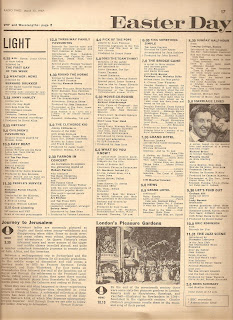Ray Moore is very much associated with BBC Radio 2’s Early Show, but when exactly did he present the show? This post aims to make a stab at giving you the facts.
Firstly the nomenclature. We normally associate the Early Show as being the show that precedes the Breakfast Show. However, in the early-80s when Ray was on the air between 5.30 and 7.30a.m. - before Wogan - The Early Show was in fact presented by Ray’s friend Colin Berry between 4.00 and 5.30 a.m. So, for the purposes of this post I’m looking at the show pre-breakfast, sometimes know as the Early Breakfast Show. Confusing!
When I first started listening to Radio 2 in 1976 the Early Show was presented by Colin Berry. I’ve traced the history of the show since that year but my knowledge prior to that is a little sketchy. If anyone has any further details I’d welcome your input.
For many years, seventeen and a half in fact, the presenter of the Early Show was Sarah Kennedy. This continuous run for the Dawn Patrol, periods of sickness aside, is the longest by a single presenter. Prior to that role would chop and change on a fairly regular basis.
When Radio 2 started in 1967 it made no distinction between an Early Show and a Breakfast Show. Breakfast Special ran from 5.30 a.m. with different presenters each day that included Paul Hollingdale, John Dunn and Ray Moore, with Bruce Wyndham on Saturdays. So Ray was setting his alarm clock early from the very beginning of the station.
Breakfast Special ended in 1972, by now just presented by John Dunn, when Terry Wogan started his famous Breakfast Show run. That same day Barri Haynes became the presenter of the very first Early Show. Barri, I believe, was a Radio 2 announcer at the time who later went on to work at LWT. Barry Alldis was presenting the show in 1972 and 1973. By the middle of 1973 Pete Brady, now back on the radio after his stint on Thames TV’s Magpie, had the 5-7 slot.
From March 1974 to January 1976 Simon Bates presented the Early Show. This run doesn’t appear to have been continuous as Ray Moore was also on the show in 1975 as was Jeff Cooper.
From 1976 Colin Berry had taken over the reins for what was to be a long association with early morning shows on Radio 2. By January 1978 Ray Moore was back on the Early Show having finished presenting the Saturday night Late Show. However, before he got too comfortable, in August that year he was off and Tony Brandon took over.
Tony’s run lasted until November 1979 whereupon the picture gets very messy with essentially Ray Moore and Steve Jones alternating every 3 or 4 months for the next two years. For the record Steve Jones, he of The Pyramid Game fame, hosted as follows: Dec 1979 to March 1980, June to Sept 1980, July to Oct 1981, Jan 1982 and finally May to June 1982. From Jan to April 1981 Bob Kilbey had a go.
During this period Ray was at the microphone March to June 1980, Sept to Dec 1980, April to July 1981. Oct to Dec 1981, Feb to May 1982. Ray finally took over his main stint as presenter from Monday 28 June 1982.
In 1982 Ray was still doing holiday relief for Wogan at Breakfast, something he’d done for a number of years. Whilst Ray moved his shift to cover, the likes of Nick Page, Jimmy Mack, Don Durbridge and Colin Berry all took turns on the Early Show.
As is well documented Ray’s run as presenter came to an abrupt end in January 1988 when he became too ill to continue. “It was over” he said “not with a bang but a whimper”.
When Ray left staff including Bill Rennells, Charles Nove, Jean Challis, Liz Allen and John Marsh held the fort until April 1988 when Chris Stuart became the next permanent presenter. Chris was no stranger to the show, having sat in for Ray when he was on leave.
Chris’s stint came to an end after just under three years in December 1990. From January 1991 scheduling changes meant that Ken Bruce was on air between 6 and 8 a.m. prior to the Derek Jameson Breakfast Show.
Further changes in 1992 meant that Steve Madden hosted until April when ‘the Dark Lord’ Alex Lester took over until December. These shows preceded the Brain Hayes Breakfast Show.
And so we come full circle when on 4 January 1993 Sarah Kennedy started her record-breaking run. The same day Wogan was back at Breakfast. Sarah left last September and since then Richard Allinson, Aled Jones and Lyn Parsons have covered. In November the BBC announced that Vanessa Feltz would host “the Early Breakfast Show” from this coming Monday.










